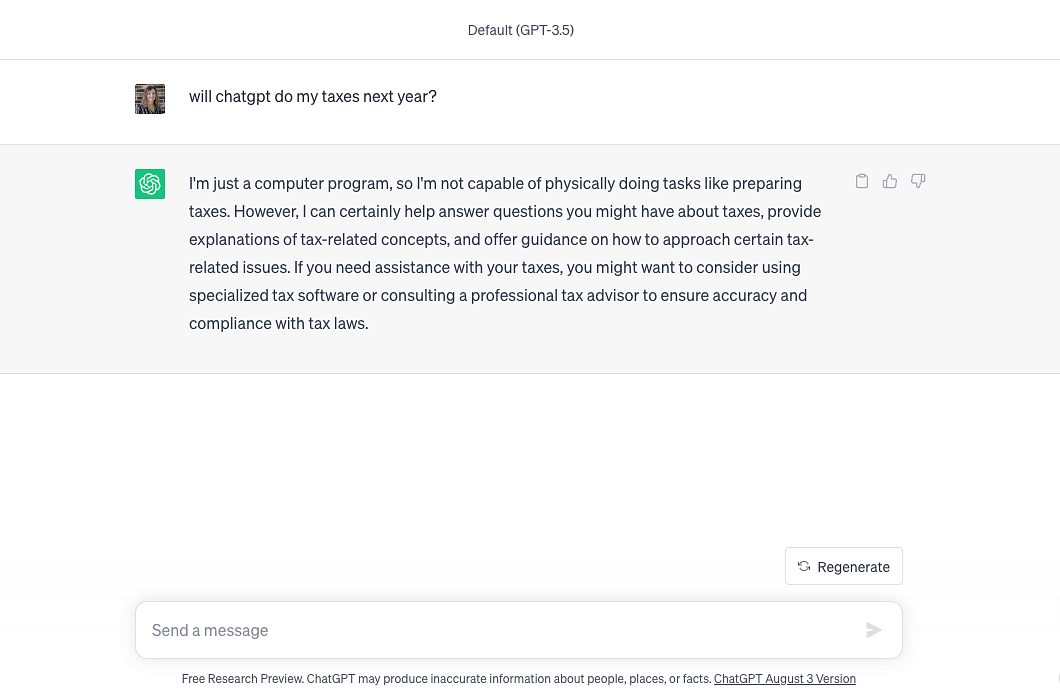
Will ChatGPT Do My Taxes Next Year?

By Gretchen Roberts

We have a Google Home at my house, and sometimes Google just can’t get it straight. It will set a timer when we’ve asked it to play a song on Spotify, or listen in on our conversation and randomly contribute fart jokes (egged on by the 7-year-old) when not wanted.
We joke that instead of “artificial intelligence,” we have a piece of “artificial stupidity” in our kitchen. As helpful as the tool can be in telling me the weather forecast or verbally adding to the grocery list when I’m chopping chicken, it has some serious limitations as a total replacement for other tools and conversations with my family.
Yet, like everyone else, I’m intrigued by the explosion of AI in the last several months, and find myself using ChatGPT for everything from writing prompts to researching esoteric topics. (Disclaimer: I wrote this piece myself. Promise.)
As AI continues to be built into products we use every day – often without us even realizing – it’s becoming a ubiquitous part of life and society.
AI and the Future of Tax and Accounting
Our firm, Red Bike Advisors (formerly Adam Shay CPA, PLLC), provides proactive tax, accounting, and virtual CFO services as well as tax resolution and fraud & forensic accounting solutions to businesses and individuals in Wilmington and beyond.
As the firm’s new owner with a background in technology, I’m bullish about the use of AI to automate manual data entry, categorize expenses, and research the endlessly-changing federal, state, and local tax and compliance laws.
On the tax side, there’s potential to automate a ton of the manual work involved in collecting and transforming documents into tax forms. In fact, last month tax software provider Taxfyle released an AI tax prep bot that the company says will change preparers into reviewers. For clients, this means the tax team has more time for proactive strategy work instead of prepping tax forms.
When it comes to accounting and bookkeeping and virtual CFO services, AI can automate many routine bookkeeping tasks and even analyze historical financial data to create forecasts that help business owners make informed decisions.
In short, AI will disrupt both the services we provide to clients, and how we provide them.
AI Won’t Replace People…Yet
As much as I love technology, I love actual human beings and the opportunity to bounce ideas around with them even more. I’m lucky to be surrounded by advisors, from my attorney and in-house accountant to my mastermind group of women business owners and my incredible leadership team at Red Bike Advisors.
If AI hands me a financial forecast and a tax projection on a silver platter, I still want to huddle with my tax advisor and CFO and talk through my options within the context of the business, our ten-year roadmap, the macroeconomic environment, and the team. There’s simply no substitute for robust debate and the anchoring of financials to our vision, mission, values, and strategic goals.
According to a recent article by McKinsey, other executives and business owners tend to agree that AI can inform strategy but not decide strategy. Growing revenue, increasing profits, and delivering an incredible customer experience are gray areas with multiple scenarios and paths.
Says the article, “Only 7 percent of respondents to our survey say they use AI in strategy or even financial planning. One reason adoption is lagging is that strategy is one of the most integrative conceptual practices…. AI tools can help executives avoid biases in decisions, pull insights out of oceans of data, and make strategic choices more quickly. ”
So bring on the AI to automate repetitive, redundant, error-prone, non-value-add tasks. But when it comes to proactive tax and financial strategy that’s aligned to your business goals, there’s no substitute for the power of great advisors.
If you’re looking for proactive advice for your business finance and tax strategy, book a free strategy session today.